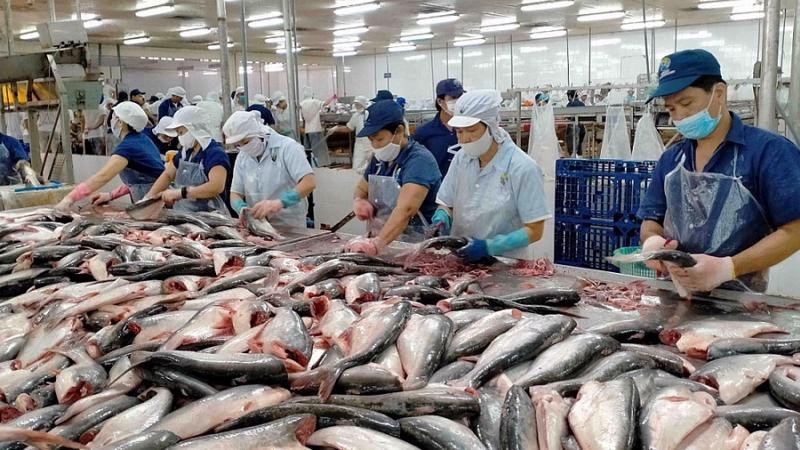
Since the UK-Vietnam Free Trade Agreement (UKVFTA) came into effect, shrimp and pangasius fish have dominated Vietnam’s seafood exports to the UK, accounting for 90% of the total export value, with shrimp leading the way.
The UKVFTA has emerged as a critical trade pact, unlocking opportunities for Vietnamese seafood to penetrate the UK market.
Effective from early 2021, the agreement has driven robust export growth through strategic and proactive market engagement.
Nguyen Hoai Nam, Deputy Secretary-General of the Vietnam Association of Seafood Exporters and Producers (VASEP), stated that UKVFTA has provided significant advantages for Vietnam’s seafood sector.
Key products, such as shrimp and pangasius, benefit from a 0% import tax, substantially easing their entry into the UK market.
Shrimp and pangasius currently represent 90% of Vietnam’s seafood export value to the UK, with shrimp contributing the lion’s share.
This impressive performance underscores the strong demand for these products in the UK.
The removal of tariff barriers has enhanced competitiveness and opened significant market share opportunities for Vietnamese businesses.
Challenges and solutions
To maximize the benefits of UKVFTA, Vietnamese seafood enterprises must improve their readiness, including securing raw materials, enhancing product quality, and strengthening supply chain capabilities.
Nam highlighted the importance of staying informed about market updates, food safety regulations, traceability, and social responsibilities.
While no longer part of the EU, the UK maintains strict quality and food safety standards similar to those of the bloc, requiring Vietnamese producers to adhere to longstanding production and processing standards.
VASEP has actively supported enterprises by updating regulations such as IUU (Illegal, Unreported, and Unregulated fishing controls) and providing market insights through its online platforms.
Collaboration with UK organizations like Seafish has further enabled Vietnamese businesses to track consumer trends and align products with UK market demands.
Administrative reform and legislative adjustments are equally vital.
VASEP emphasized that while trade agreements like UKVFTA offer advantages, businesses need macroeconomic policy support to optimize these benefits.
Vu Viet Thanh from the European-American Market Department (Ministry of Industry and Trade) echoed this sentiment, urging companies to leverage transparent data systems like the UK government’s trade databases to better understand the market.
Thanh also advised seafood exporters to ensure traceability, maintain rigorous food safety standards, and adopt advanced technology in production and processing to boost competitiveness.
Careful vetting of international partners and contract details is also essential for sustainable growth and minimizing risks in cross-border trade.
The UKVFTA has laid a solid foundation for Vietnam’s seafood industry in the UK market.
While the agreement offers unique opportunities, turning potential into success requires businesses to adopt intelligent market strategies and prepare for intense global competition.
Nguyen Le